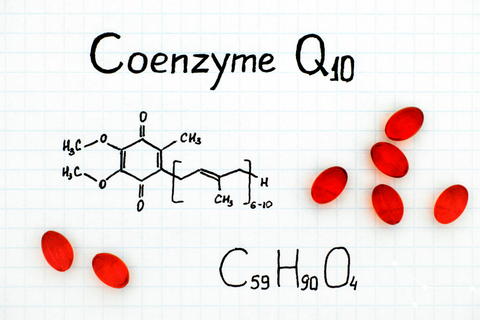Coenzyme Q10 (aka. ubidecarenone or ‘CoQ10’)
Coenzyme Q10 or ‘CoQ10’ is a vitamin-like compound that acts as a cofactor in many critical metabolic pathways, including the production of adenosine triphosphate (ATP) in oxidative respiration, which is responsible for the production of 95% of the body’s energy. It also serves important roles as an antioxidant and cell membrane stabiliser. As the body is capable of synthesising coenzyme Q10, it is not technically considered a vitamin, despite functioning in a similar way to typical vitamins obtained from dietary sources.
CoQ10 is ingested in small amounts in dietary sources – most notably meat and seafood, with lower amounts consumed from fruits and vegetables. Absorption of coenzyme Q10 from food sources appears to be equivalent to absorption of coenzyme Q10 from supplements. However, the majority of the body’s daily CoQ10 requirement is normally derived via biosynthesis within the body. The biosynthesis of CoQ10 is dependent on a 17-step process involving a myriad of vitamins and trace elements, including vitamins B2 (riboflavin), B3 (niacinamide), B5 (pantothenic acid), B6 (pyridoxine), B9 (folate), B12 (cobalamin) and vitamin C. Because its biosynthesis is dependent on these nutrients, it is important that sufficient quantities are consumed in the human diet, as deficiencies in any of these cofactors can result in suboptimal CoQ10 biosynthesis.
Vitamin B12 in particular is almost exclusively sourced from animal food products, and B12 deficiency is therefore more common in those who consume strict plant-based diets without adequate supplementation. Some vegetarians and vegans are at risk of other B vitamin deficiencies. For example vegetarian athletes are more susceptible to vitamin B2 (riboflavin) deficiency due to increased demands and insufficient intake due to avoidance of B2-rich animal sources. B vitamin deficiencies uncommonly occur in isolation, with B12 deficiency for example often associated with deficiencies in other B vitamins including vitamin B6.
Due to plant-based diets having lower quantities of CoQ10 than animal products, and its biosynthesis being dependent on several cofactors which are more prevalent in animal foods, IMUNI recommends strict vegetarians and vegans consider taking a supplement containing at least 60mg of CoQ10 on a daily basis to ensure adequate intake of this important energy-producing powerhouse and antioxidant.
References:
- Mantle & Dybring. 2020. Bioavailability of Coenzyme Q10: an overview of the absorption process and subsequent metabolism. Antioxidants. 9 (5): 386. [cited 24 Nov 2021]. Available from: https://www.ncbi.nlm.nih.gov/pmc/articles/PMC7278738/
- Coenzyme Q10. TRC natural medicines database. [cited 24 Nov 2021]. Available from: https://naturalmedicines.therapeuticresearch.com/
- Vitamin B12. Fact Sheet for Health Professionals. National Institutes of Health. Office of Dietary Supplements. [cited 24 Nov 2021]. Available from: https://ods.od.nih.gov/factsheets/VitaminB12-HealthProfessional/
- Riboflavin. Fact Sheet for Health Professionals. National Institutes of Health. Office of Dietary Supplements. [cited 24 Nov 2021]. Available from: https://ods.od.nih.gov/factsheets/Riboflavin-HealthProfessional/
- Vitamin B6. Fact Sheet for Health Professionals. National Institutes of Health. Office of Dietary Supplements. [cited 24 Nov 2021]. Available from: https://ods.od.nih.gov/factsheets/VitaminB6-HealthProfessional/


